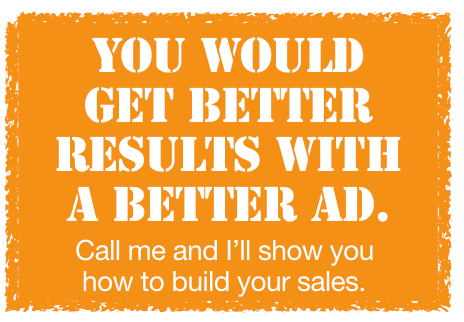How I learned about treating customers with respect.
Years and years ago, I came up with a brilliant idea for attracting new business. In my daily scouring of newspapers, magazines, and other media (thankfully, this was before the Internet), I’d look for advertising that I thought was poorly done. I’d rip the offending page out of the newspaper or magazine and slap a neon orange sticker on its face. The sticker read, “You would get better results with a better ad.”
Then, I’d shove the marked-up ad in an envelope and send it to the company’s CEO. I thought I could help. I’d include a note introducing myself and my agency and telling them what we could do for them.
Shockingly, I didn’t get any responses. At first, I didn’t understand why.
After all, I had looked at their advertising materials and even offered to help them out. So why weren’t they calling and accepting my generous offer? It couldn’t be a matter of money because I hadn’t told them what I would charge for our services.
What I’ve learned through hindsight, maturity, and the experience of getting knocked flat on my ass one too many times, is that people don’t like being told they’re idiots.
Which is precisely what I was doing. What I wasn’t doing was treating customers with respect.
Instead of being helpful, I was presumptuous.
Instead of being insightful, I was irritating.
Instead of enlightening, I was insulting.
And instead of giving my prospects a real reason to do business with me, I gave them every reason to stay as far away as possible.
In my defense, I’m not the only one who has built a business strategy around not treating customers with respect.
How many people concerned about their weight enjoy asking for a seatbelt extender on an airplane?
How many people concerned about their age enjoy requesting the senior discount?
What middle-aged person just returning to a fitness regime wants to walk into a hard-body gym?
Do you want to buy a computer from a knowledgeable IT salesperson who makes it clear you don’t know what you’re buying?
Do you want to buy a car from a salesperson who asks if you “…need to check with your spouse first?”
What father wants to be asked by his child’s preschool teacher if he’s “babysitting today?”
What voters like being told they’re racist, misogynistic, uneducated, deplorable, elitist, close-minded, dishonest, lazy, immoral, unengaged, or crooked?
Few consumers like to be told they’re stupid, over the hill, overweight, clueless, unwelcome, cheap, or uninformed, even if they are. Instead, they want to be treated with respect, compassion, interest, concern, politeness, and graciousness.
Yes, some nightclubs fill their tables by making people wait behind velvet ropes.
And yes, there are upscale boutiques that sell clothing at outrageous prices simply by looking down on their customers.
But the Internet is making that reality rarer and rarer. In a world where almost anything is instantly available, and anyone can comment on anything anytime, consumers have more choices than ever.
And when they have these choices, you can be sure they won’t frequent businesses that make them feel bad about being there. Or worse, make them feel bad about themselves.
Treating customers with respect
All About Them is not only the title of my book but also the three-word mantra that can transform your business for the new year and the new world we all find ourselves in. Make sure you’re always looking for ways not to talk about yourself and your company but about how you improve your consumers’ lives, and you can change your relationship with them.
That will generate increased inquiries, increased sales, and increased loyalty. All About Them is not just a title. It’s a way of life.


It always has been and always will be. Bernbach said it: “Human nature hasn’t changed in a million years and it isn’t likely to anytime soon.”
I ask people “So you’re at a cocktail party and you meet some new people, do you enjoy talking to those who just talk about themselves, or those who ask about you?”
It ain’t rocket science. Resist the belief that if you don’t talk about you and your product they’ll never know why you’re better. They have to like you first, or they won’t care.
Right you are, Skip.
I think between Bernbach, Ogilvy, and Gossage it was all figured out and laid at our feet years ago.
Now if only we were all smart and disciplined enough to follow their leads…
Nice! Great article, Bruce.
Thank you Thomas.
I think of “It’s All About Them” as the best business book since Dale Carnegie’s “How to Win Friends and Influence People” (1936) and Mark McCormack’s “What They Don’t Teach You at Harvard Business School” (1986) … it’s kind of a blend of both.
I’ve read it only twice, but I refer to my annotated copy regularly.
Thank you Michael. I always appreciate your very kind words.
Early in my ad career, I met with a prospect who had a horrible logo…a capital D&W and an old oil rig. However, instead of saying the logo sucked, I asked “tell me about your logo?” The client said the “D” stands for me and the “W” stands for my wife “Wilda”.
I told him his logo looked great. Sometimes discretion is the better part of valor, especially on the first meeting.
You’re a better man than I am (or was) George. I think my best response would have been the euphemistic “interesting.”